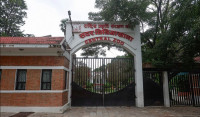Valley
Hostel business: Disparities rampant without government regulation
In 2012, the Kathmandu District Administration Office drafted a 29-point criterion for hostel operation.
Gaurav Thapa
Hostel owners say despite their repeated calls for approval, some procedural and bureaucratic hurdles have delayed the process. Now, the regulation has reached the Prime Minister’s Office, with inputs from the Domestic and Small Cottage Industries.
With Kathmandu being the most preferred destination for students in the country, thousands need a place of affordable accommodation. Informed sources say close to 1,000 hostels, including those run by individual owners and by colleges, are operational in the Valley.
A typical hostel provides accommodation, food and other basic necessities to residents. In the absence of regulation, disparity in service and fees are rampant.
Chetan Dahal, general secretary of the Nepal Hostel Association—an umbrella organisation comprising 380 official members in Kathmandu, Lalitpur, Kaski and Chitwan—said they are trying to regulate hostels on their own. “Our aim is to drive all hostels towards improvement and uniformity,” said Dahal. “We have directed our members to provide students with four meals a day, maintain appropriate infrastructure, provide laundry service and the Internet and ensure quality in services.”
Kashi Nath Puri, 23, an engineering student from Itahari, stays at a hostel in New Baneshwor. “The best part of living in a hostel is that it saves time which I can devote towards my education,” he said.
Not everyone is as satisfied as Puri, though. A few people who did not want to be named identified the quality of food and overall hygiene as the main problems in their respective hostels. “I want to relocate but it is same everywhere,” was the general opinion.
Hostel operators blame increasing costs as the main reason for compromising with quality. “Students demand the best at minimum price. Our estimates show an average daily cost of around Rs 250 per student per day for standard services, which is what we normally charge. Increasing costs has hit us hard,” Dahal said.
Hari Gopal Timsina, owner of Pashupati Boys Hostel in Chabahil, has been in this business for three years. “I saw a huge demand among students for quality hostels and decided for it.” At a time when indiscipline and bad behaviuor are considered common among
students, hostel owners like Timsina have to be alert. “Proper guardianship and close scrutiny are keys in running hostels successfully. Parents leave their kids under my care and it is my responsibility to look after them.”
Timsina also said there is a lack of official guidelines for hostel operation. Nevertheless, he has acquired Permanent Account Number for his hostel with recommendation from the Department of Cottage and Small Industries as per the normal procedure to operate a business.
“We are providing a very important service to students,” said Dahal. “We want the government to recognise us as legitimate taxpaying businesses and make guidelines to regulate this industry.”




 25.47°C Kathmandu
25.47°C Kathmandu











